Naval Brass (UNS C46400)

Naval brass C46400 is a high-strength copper alloy renowned for its exceptional seawater corrosion resistance. It is widely used in marine hardware, offshore structures, and heat exchangers due to its durability and machinability.
| Chemical Composition | ||
|---|---|---|
| Element | Min | Max |
| Copper | 59.0% | 62.0% |
| Iron | —— | 0.1% |
| Lead | —— | 0.2% |
| Tin | 0.5% | 1.0% |
| Zinc | —— | Remainder |
The following table provides a list of brass C46400 properties in both SI and US customary/Imperial units.
Click on the button to switch between Metric and Imperial units.
| Physical Properties | Metric |
|---|---|
| Density | 8410 kg/m3 |
| Mechanical Properties | Metric |
| Tensile Strength (Ultimate) | 380 - 610 MPa |
| Tensile Strength (Yield) | 160 - 450 MPa |
| Shear Strength | 270 - 310 MPa |
| Young’s Modulus (E) | 100 GPa |
| Shear Modulus (G) | 39 GPa |
| Elongation at Break | 15 - 50% |
| Poisson’s Ratio (ν) | 0.31 |
| Thermal Properties | Metric |
| Melting Point | 885 - 900 °C |
| Thermal Conductivity | 116 W/m·K |
| Specific Heat Capacity (Cp) | 380 J/kg·K |
| Coefficient of Thermal Expansion (αL) | 2.12×10-5 1/°C |
| Electrical Properties | Metric |
| Electrical Conductivity | 1.58×107 S/m |
| Electrical Resistivity | 6.6×10-8 Ω·m |
The values in this table are approximate and can vary depending on various factors such as the specific manufacturing process and heat treatment applied to the alloy.
Advantages & Disadvantages of Naval Brass C46400
| Advantages | Disadvantages |
|---|---|
| Good corrosion resistance | High cost |
| High strength | Lead content |
| Excellent machinability |
Applications of Naval Brass C46400
Naval brass C46400 is a versatile alloy that finds numerous applications in various industries, including:
- Marine Hardware: This alloy is extensively used in marine hardware due to its excellent corrosion resistance in seawater. Common applications include components such as propeller shafts, pumps, valves, fittings, fasteners, and shipbuilding components.
- Offshore Structures: The material is suitable for offshore structures, including oil rigs, platforms, and pipelines. Its corrosion resistance and high strength make it a reliable choice for withstanding harsh marine environments.
- Heat Exchangers and Condenser Tubes: This brass is employed in the manufacturing of heat exchangers and condenser tubes due to its corrosion resistance and good thermal conductivity. These components are widely used in power plants, HVAC systems, and industrial processes.
- Electrical Connectors: The alloy is utilized for electrical connectors and terminals due to its good electrical conductivity and corrosion resistance. Common uses include electrical and electronic equipment, connectors for shipboard wiring, and electrical grounding components.
- Architectural Applications: The aesthetic appeal makes it suitable for architectural applications. It’s often chosen for decorative elements, ornamental fixtures, handrails, and fittings in buildings and public spaces.
- Industrial Valves and Fittings: This material is used in the manufacturing of valves, fittings, and couplings for industrial applications. Its corrosion resistance, strength, and machinability make it a preferred choice in industries such as oil and gas, chemical processing, and water treatment.
